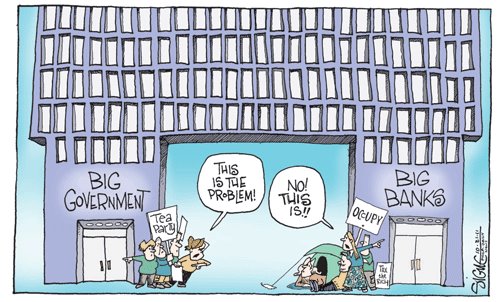
Photo by Pixabay on Pexels.com
Since the heyday of McCarthyism, any suggestion that capitalism is flawed has been met with overt hostility. In the United States, capitalism has become more a religion than an economic system.
There’s recently been much ado about millennials preferring socialism to capitalism, but what many commentators are overlooking is that people aren’t railing against markets, they’re sick of living with “cancer as the model of our social system.” You can wrangle definitions, but at the end of the day capitalism isn’t the only way to have a market.
Citizens from all over the political map see problems with increasing economic disparity but are laying the problems at the feet of different political scapegoats. The left blames the rich, and the right targets government as the source of their woes. If we take a step back and look at the situation, a clearer picture emerges. The collusion of big government and big business has formed one of the strongest corporatist government/economic hybrids the world has ever seen, excluding perhaps the Dutch East India Company.

A comic I blatantly stole from the internet. I can’t read the signature, so if it’s yours I can take it down if you don’t like it here.
In the richest country the world has ever known, why are there people dying because they can’t afford their medicine while billionaires have so much money they don’t know what to do with it all? I don’t believe that taxing the rich is the answer. Rethinking our economic system is. As one person said, “If you’re talking about wealth redistribution, you’re already too late.”*
Capitalism as it’s currently practiced in the United States, where “all animals are equal, but some animals are more equal than others,” is reaching a breaking point. Cutting back federal programs could allow subsidiarity to guide more tailor-made policies crafted at a local level. Even environmental protection can be carried out as compacts between states as has been done with the Regional Greenhouse Gas Initiative (RGGI). Our current reliance on the federal government for regulations has led to a regulatory monoculture that allows national and international megacorps to grow out of control. This would be a lot less likely if companies had to meet 50 different sets of business regulations or even more in state’s that don’t restrict municipal regulations through use of the Dillon Rule.

Photo by Jopwell on Pexels.com
In 1888, Benjamin Tucker defined two forms of socialism: state socialism, and what is today known as anarcho-socialism. His essay reads as a prophecy of the horrors committed by the USSR in it’s pursuit of “equality.” It also shows that even 130 years ago, socialism didn’t have one “correct” definition. A lot of the tension in US politics right now is from people using the same words to mean different things. In a living language such as English, this isn’t unexpected. If we spent a little more time listening before opening our own mouths, we might find we have more in common than we think.
As someone who grew up as a devotee of free market capitalism, I’ve grown more and more suspicious that any one economic ideology is really suited for something as complex as human society. Maybe capitalism can be reformed, but dismissing alternatives out of hand is not a responsible way forward when we’re discussing something that so greatly influences the outcomes of people’s lives. No one is suggesting Soviet-style socialism, so conservatives should stop using the USSR as a bogeyman to distract from good-faith conversations regarding postcapitalism. Capitalism served us well for a time, but that doesn’t mean it’s the end of economic evolution. As they say, “Insanity is doing the same thing over and over again and expecting different results.” Capitalism as it is has failed marginalized groups as it was designed for wealthy white people. This is evident in prison slavery and the continued existence of tipping for service work in the United States. I think we can do better for a solarpunk future.
Are you critical of capitalism? Do you still believe that markets are an effective tool for managing scarce resources, or have you seen something else that could help us manage those things that still can’t be produced in abundance? Let us know below!
* I heard this attributed to the CEO of Mondragon, but can’t seem to find it anywhere, so consider it apocryphal for the time being. It might originally be in Spanish or Basque, so if anyone out there has seen the original, let me know and I’ll update this article.


